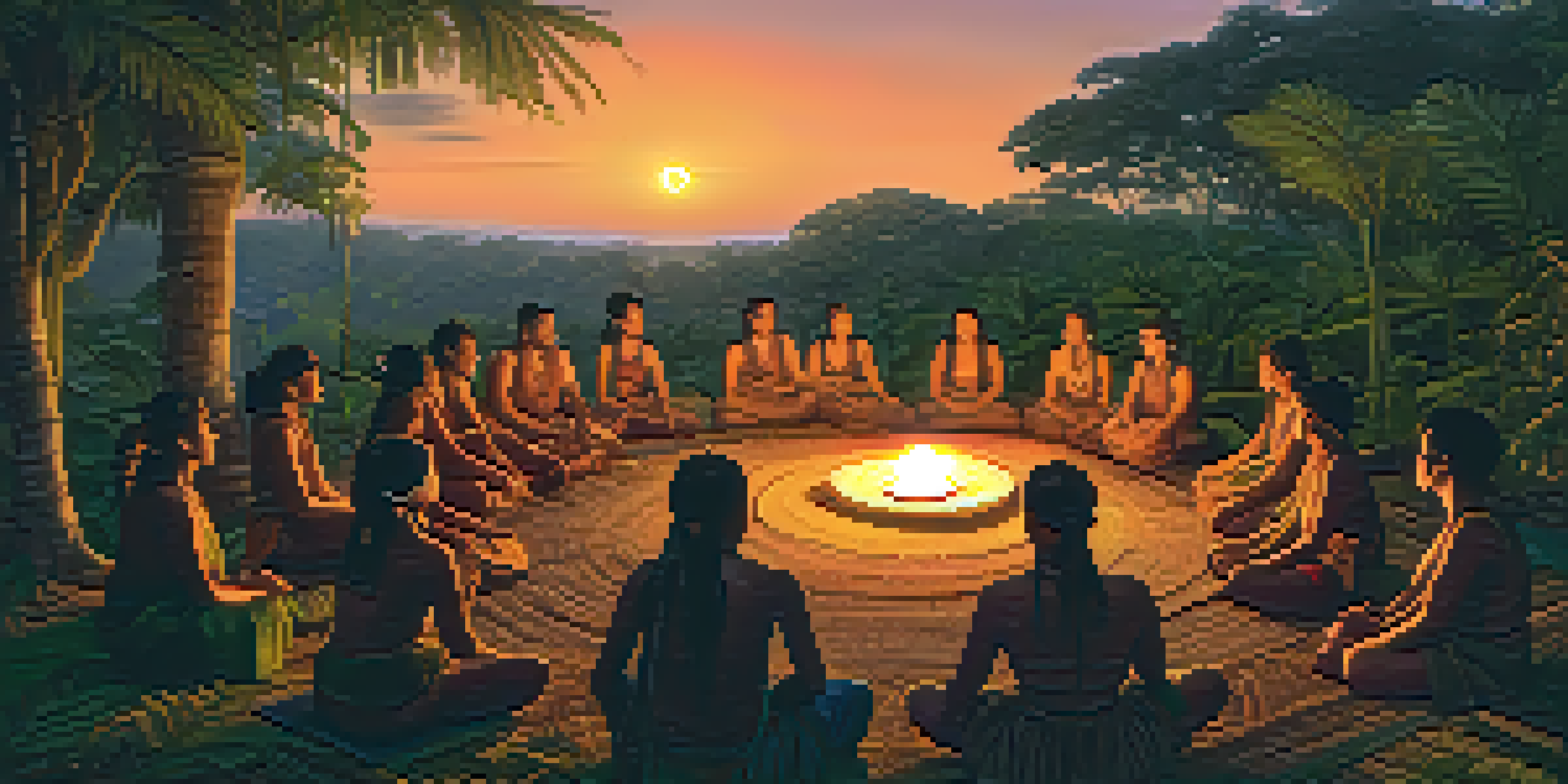Ayahuasca: A Journey Towards Authentic Self-Discovery

What is Ayahuasca and Its Cultural Background?
Ayahuasca is a potent brew made from the Banisteriopsis caapi vine and other plants, traditionally used by Indigenous cultures in the Amazon for spiritual and healing purposes. It's often consumed during ceremonies led by experienced shamans, who guide participants through their journeys. This sacred drink has been a vital part of Amazonian spirituality for centuries, intertwining with the culture and beliefs of the communities that use it.
The plant medicine is not a cure; it's a journey towards healing.
The experience of Ayahuasca is not just about the drink itself; it embodies a rich tapestry of rituals and traditions. These ceremonies often take place in natural settings, enhancing the connection between the participants and the environment. The shaman's role is crucial, as they facilitate the journey, using songs and chants to help guide individuals through their inner exploration.
In recent years, Ayahuasca has gained popularity beyond its traditional roots, attracting seekers from around the globe looking for healing and self-discovery. This shift raises important discussions about cultural appropriation and the ethical considerations of using sacred plants outside their original context.
The Psychological Impact of Ayahuasca Experiences
Many people who undergo Ayahuasca ceremonies report profound psychological insights and emotional healing. Participants often describe their experiences as a deep dive into their subconscious, where they confront past traumas and unresolved emotions. This journey can lead to a sense of catharsis and relief, paving the way for personal growth.

Studies suggest that the active compounds in Ayahuasca, such as DMT and harmine, may promote neuroplasticity—the brain's ability to reorganize itself by forming new connections. This scientific backdrop adds depth to the anecdotal evidence of Ayahuasca's transformative effects, making it a subject of interest in the fields of psychology and psychiatry.
Ayahuasca's Cultural Significance
Ayahuasca is a sacred brew traditionally used by Indigenous Amazonian cultures for spiritual healing and community rituals.
However, it's essential to approach these experiences with caution. While many find healing, Ayahuasca is not a one-size-fits-all remedy; some may face challenging emotions or visions during their journey. Proper preparation and integration afterward are crucial to maximizing benefits and minimizing potential risks.
Preparing for Your Ayahuasca Journey
Preparation is key to ensuring a safe and enriching Ayahuasca experience. Many centers recommend a period of physical and mental detox before the ceremony, which may include dietary restrictions and meditation practices. This preparation helps participants to be in a receptive state, allowing them to fully engage with the experience.
In the depths of the soul, we find the light of our true selves.
Setting intentions is another vital aspect of preparation. What do you hope to discover or heal? By clarifying your intentions, you create a roadmap for your journey, guiding your subconscious during the experience. Writing down your intentions can also aid in the integration process afterward.
Additionally, finding the right retreat center is crucial. Look for places that prioritize safety, have experienced facilitators, and foster a respectful environment for the Ayahuasca tradition. Researching testimonials and understanding the center's approach can greatly enhance your overall experience.
What to Expect During an Ayahuasca Ceremony
During an Ayahuasca ceremony, participants typically gather in a circle, often under the guidance of a shaman. After a brief introduction, the shaman usually leads a prayer or blessing, creating a sacred space for the journey ahead. Once the Ayahuasca is consumed, participants may begin to feel the effects within 30 to 60 minutes, including visual and auditory changes.
As the experience deepens, individuals might encounter a range of emotions, from joy and love to fear and sadness. It's common to experience vivid visions that can be symbolic or deeply personal, reflecting aspects of one’s life or psyche. While these experiences can be intense, they often serve as opportunities for insight and healing.
Healing Through Psychological Insights
Participants often experience profound psychological shifts during Ayahuasca ceremonies, promoting emotional healing and personal growth.
The ceremony typically lasts several hours, and participants may be encouraged to lie down, reflect, or share their experiences as they unfold. The presence of the shaman, who might sing Icaros (traditional songs), helps to navigate the energies and emotions that arise, providing comfort and guidance throughout the night.
Understanding the Role of Integration After Ayahuasca
Integration refers to the process of making sense of the Ayahuasca experience and incorporating its lessons into daily life. After such profound journeys, individuals often feel a mix of emotions and insights, which can be overwhelming. Therefore, having a plan for integration is crucial for maximizing the benefits of the experience.
Many find it helpful to engage in practices such as journaling, therapy, or support groups to process their experiences. Discussing insights with others who have undergone similar journeys can foster a sense of community and understanding, further enhancing the integration process. Sharing your story can also provide clarity and reinforce the lessons learned.
Additionally, maintaining healthy habits post-ceremony, such as a balanced diet, regular exercise, and mindfulness practices, can help ground the insights gained during the journey. Integration is an ongoing process, and allowing time for reflection and growth is essential for fostering lasting change.
The Potential Risks and Challenges of Ayahuasca
While many find healing through Ayahuasca, it's important to acknowledge the potential risks involved. Some individuals may experience intense emotional pain or confront traumatic memories during their journey, which can be challenging to navigate without proper support. Therefore, having a trusted shaman or facilitator is crucial to guide participants through these difficult moments.
Physical side effects can also occur, including nausea and vomiting, which are often referred to as 'purging.' For many, this purging is seen as a necessary part of the healing process, allowing them to release emotional and physical toxins. However, it's essential to approach this aspect mindfully and ensure that the environment is safe and supportive.
Importance of Integration Post-Ceremony
Post-ceremony integration is crucial for making sense of Ayahuasca experiences, allowing individuals to incorporate insights into their daily lives.
Moreover, Ayahuasca may interact negatively with certain medications, particularly antidepressants. It’s vital for anyone considering this journey to consult with a healthcare provider and disclose any medications or health conditions to ensure a safe experience.
Embracing Authenticity Through Ayahuasca Insights
One of the most profound gifts of Ayahuasca is the opportunity for authentic self-discovery. Many participants report gaining clarity about their life purpose, relationships, and personal challenges. This newfound understanding often ignites a desire to live more authentically, aligning actions with values and beliefs.
Ayahuasca can serve as a mirror, reflecting back the parts of ourselves that we might ignore or suppress. As participants confront these aspects, they often feel a sense of liberation, letting go of societal expectations or self-imposed limitations. This journey towards authenticity can be both exhilarating and daunting, but it ultimately leads to a more fulfilled life.

Ultimately, Ayahuasca invites individuals to embrace their true selves, fostering a sense of connection not only to themselves but also to the world around them. By integrating the insights gained from this spiritual journey, many find themselves on a path of continuous growth and self-discovery, empowered to make choices that resonate with their authentic selves.